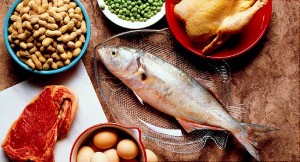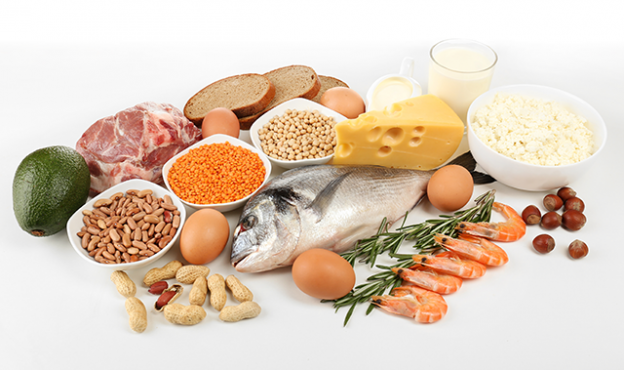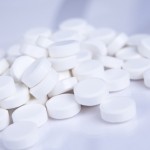By Anthoney J. Andersen – Steroidal.com
It’s no secret that as you age, your body doesn’t operate at the same caliber as it did when you were in your twenties. Even if you engage in a rigorous exercise program and eat healthy, your body will still struggle to preserve the lean muscle mass and strength that it once possessed.
 There are many factors that cause this, such as a decrease in testosterone, a lower metabolism and a decrease in bone mass and health. Whether you’re training for the Ironman Triathlon or simply looking to sculpt that beach body for the summer months, protein intake plays a pivotal role in helping you achieve your fitness goals.
There are many factors that cause this, such as a decrease in testosterone, a lower metabolism and a decrease in bone mass and health. Whether you’re training for the Ironman Triathlon or simply looking to sculpt that beach body for the summer months, protein intake plays a pivotal role in helping you achieve your fitness goals.
But how much protein does your body really need?
Let’s find out.
PROTEIN’S ROLE IN THE BODY
Proteins are large, complex molecules constructed from a set of 20 amino acids, eight of which must be obtained through diet, and are not produced naturally by the body. Each protein’s specific function is determined by its amino acid arrangement, and these arrangements can vary considerably.
While most people know proteins as molecules used to assist in the repair and growth of cells, in reality, protein plays a much larger role in the body.
According to an article in The San Francisco Chronicle titled, “5 Roles of Protein,” protein plays a variety of crucial roles in the human body:
BODY TISSUES AND MUSCLES
Protein is necessary in the building and repairing of body tissue – especially muscle tissue. If you do not receive enough protein in your diet, then muscle atrophy and other symptoms may result. Exercises like strength training cause micro tears in the muscle, and as your body begins to repair these tears, it causes the muscles to enlarge.
Protein is necessary for your body’s immune response that helps heal these tiny muscle tears. However, keep in mind that consuming excess amounts of protein will not help your body build extra muscle. In fact, the extra protein is instead used to provide your body with energy, or turned into fat.
HORMONES
Protein-based hormones – commonly referred to as peptide hormones – are made up of amino acids, which are the structural building blocks of all proteins. Protein hormones bind to receptors on the cell membrane instead of entering the cell directly. Hormonal proteins – like insulin and oxytocin – play vital roles like controlling blood sugar concentration and stimulating contractions during childbirth.
Hormones can also activate muscle growth by increasing protein synthesis or decreasing protein breakdown.
ENZYMES
Enzymes are biological molecules (typically proteins) that significantly speed up the rate of virtually all of the chemical reactions that take place within cells. Enzymes are responsible for muscle contraction and relaxation, and nerve impulse transmissions. Amylase and lipase are enzymes that help you digest carbohydrates and fat.
IMMUNE SYSTEM
Your body uses amino acids found in dietary protein to help build proteins within your body – including proteins that help make up your immune system. For example, immunoglobulins – also called antibodies – are proteins that circulate in your blood and make up key components of a strong immune system.
Proteins are also part of antibodies, which help attack viruses, bacteria, or other foreign substances in your body.
ENERGY
When the proteins you eat are digested, they’re broken down into individual amino acids, so that the cells in your body have access to whichever ones they need for the job at hand. About 75 percent of amino acids are used to synthesize new proteins. These proteins help build and repair tissues including muscles, bones and skin.
They’re also used to produce enzymes that digest food and activate your metabolism.
THE DAILY INTAKE
Without realizing it, you are probably getting enough protein in your daily diet; however, are you making the wisest protein choices?
As mentioned before, you need protein in order for your muscles, bones – and the rest of your body for that matter – to function properly.
According to WebMD, the following is the recommended daily intake depending on your age:
- Babies need about 10 grams a day.
- School-age kids need between 19-34 grams a day.
- Teenage boys need up to 52 grams a day.
- Teenage girls need 46 grams a day.
- Adult men need about 56 grams a day.
- Adult women need about 46 grams a day (71 grams if pregnant or breastfeeding).
You should get at least 10 percent of your daily calories, but not more than 35 percent, from protein, according to the Institute of Medicine.
HEALTHIEST PROTEIN SOURCES
It’s true that protein can help you shed those unwanted pounds, while keeping your belly full, but it’s important to eat the right amount – as well as the right kind – of protein, to receive its health benefits.
According to an article in Reader’s Digest titled, “Lean Protein: 11 Healthy Ways to Load Up,” the following are some examples of the best food sources for your daily protein:
LEAN MEAT
Ground sirloin is considered to be the leanest cut of meat on the market. A 3-ounce serving has 196 calories, 10 grams of fat and 23 grams of protein. The next leanest cut of meat is ground round, which has 218 calories, 13 grams of fat and 21 grams of protein. Next in line is ground chuck and ground beef, both contain around 231 calories, 15 grams of fat and 29 grams of protein.
EGGS
Not only are eggs an excellent source of protein, but also relatively inexpensive. One large, hard-boiled egg contains seven grams of protein and has just two grams of saturated fat. To avoid the saturated fat altogether, simply eat the egg white and throw out the yolk.
SEAFOOD
Fish has six times more protein than milk, making it one of the best sources of protein available. Fresh fish can often be pricey, so vacuum-packed sole, cod or salmon fillets are the next best thing. Keep some in the freezer and you’ll always have ingredients for a healthy dinner on hand.
THE WRAP UP
As we age, we naturally lose muscle mass and strength due to reduced muscle response to protein intake, changing hormones – and for some – less physical activity.
So, making sure you consume enough protein as you get older will not only lead to greater muscle mass, but it will also make you more apt to stick with the health-boosting physical activities you enjoyed in your younger years.
Win-win.







